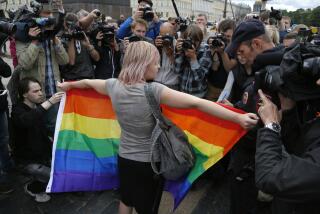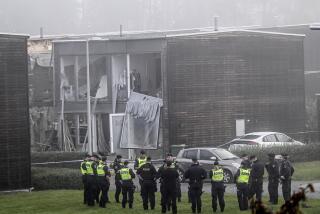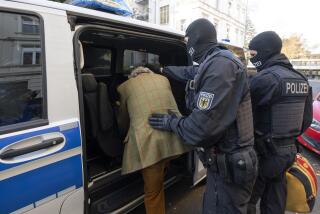Ethnic violence surges in Russia
MOSCOW — Throats slashed and bodies dumped, three slain Uzbek immigrants were discovered in the Moscow region, police announced Wednesday as racial violence continued to climb starkly in Russia’s streets.
This year has seen a dramatic increase in skinhead and neo-Nazi attacks, human rights groups say, many of them aimed at Caucasian and Central Asian immigrants from hardscrabble former Soviet republics who flock to Russia to eke out a living. The bodies turn up beaten, bruised and stabbed, sometimes mutilated or bearing signs of torture.
The first body discovered was of a 32-year-old Uzbek killed Tuesday night. Later that night, the bodies of two Uzbek brothers, ages 23 and 30, were found in a house under construction, according to the Russian Interfax news agency. Such crimes have often been tied to race, but police have not yet announced a motive in the cases.
Human rights groups complain that the government has failed to stanch, and has even implicitly fostered, the ethnic violence. More than 50 people have been killed in racially motivated attacks this year, compared with fewer than 20 such deaths in the same period last year, the rights groups say. Critics accuse authorities of encouraging ultranationalistic, xenophobic groups and failing to thoroughly investigate or prosecute hate crimes.
In one case that was prosecuted, six Russian men were found guilty Wednesday of bombing a multiethnic market in Moscow in 2006. The blast, which killed 14 people and wounded 61, stands as an emblematic attack in a campaign by ultranationalists to drive immigrants out of Russia with violence.
The killings this week of the Uzbeks came to light on the eve of a planned demonstration in Moscow by the Movement Against Illegal Immigration, a group whose rallies have traditionally been gatherings for ultranationalists and neo-Nazis, arms held high in salute to Adolf Hitler.
This group and other such organizations are allowed to hold regular rallies and marches in Russia and draw thousands of participants who shout racist slogans and demonstrate unmolested. By contrast, police often crack down on anti-government protests by pro-democracy groups, and gay pride demonstrations are banned.
“Xenophobes feel comfortable in Russia. They feel protected,” said Lev Ponomaryov, head of the Moscow-based For Human Rights organization. “It’s very difficult to get the authorities to pay serious and adequate attention to these crimes.”
At least one leader of a neo-Nazi organization has bragged publicly about participating in attacks on ethnic minorities, Ponomaryov said. His organization lobbied the government to investigate the man’s boasts, he said, but the requests were ignored.
The governments of several Central Asian countries also have implored Russian authorities to better protect the millions of immigrants who seek work in the shadow of a global oil and gas boom that has greatly benefited Russia.
Earlier this year, the government of Kyrgyzstan complained to Moscow about the rise in crime against its citizens. The protest came after a string of particularly gory slayings. In one case, the body of a 22-year-old Kyrgyz man was found, his stomach cut open, his throat slashed and a star carved into his torso.
“These [nationalistic] groups portray themselves as the protectors of the Russian people against internal threats,” said Oleg Panfilov, head of the Moscow-based Center for Journalism in Extreme Situations.
“They are becoming more popular and more communicative,” Panfilov said. “They have a huge number of websites and blogs on the Internet, and the authorities aren’t doing anything to stop them or to curb the spread of nationalism.”
--
More to Read
Sign up for Essential California
The most important California stories and recommendations in your inbox every morning.
You may occasionally receive promotional content from the Los Angeles Times.










